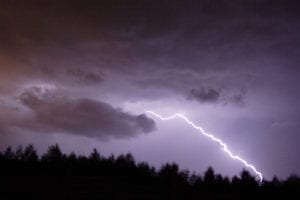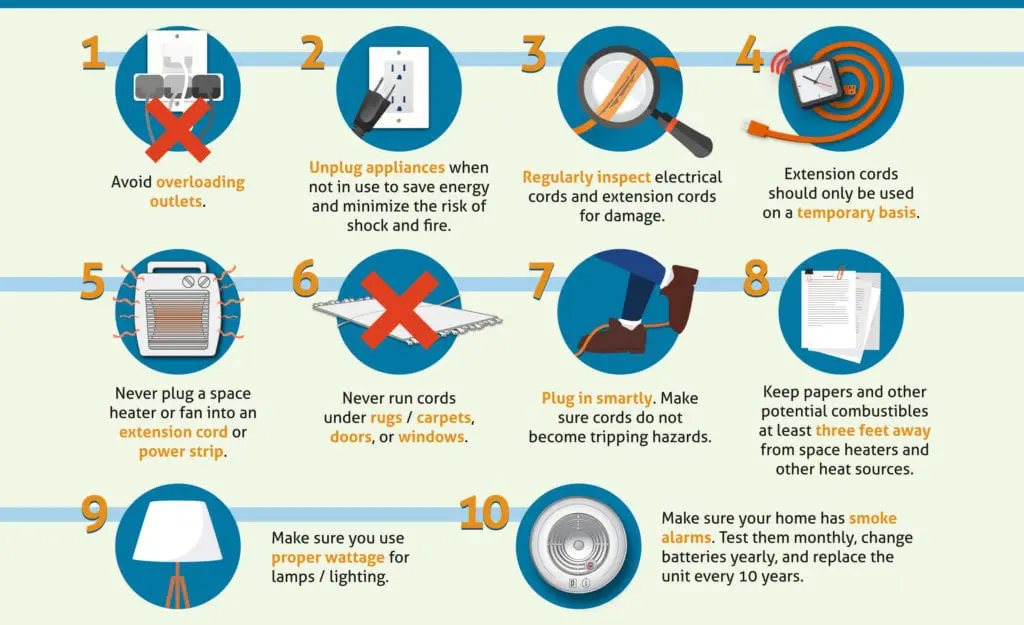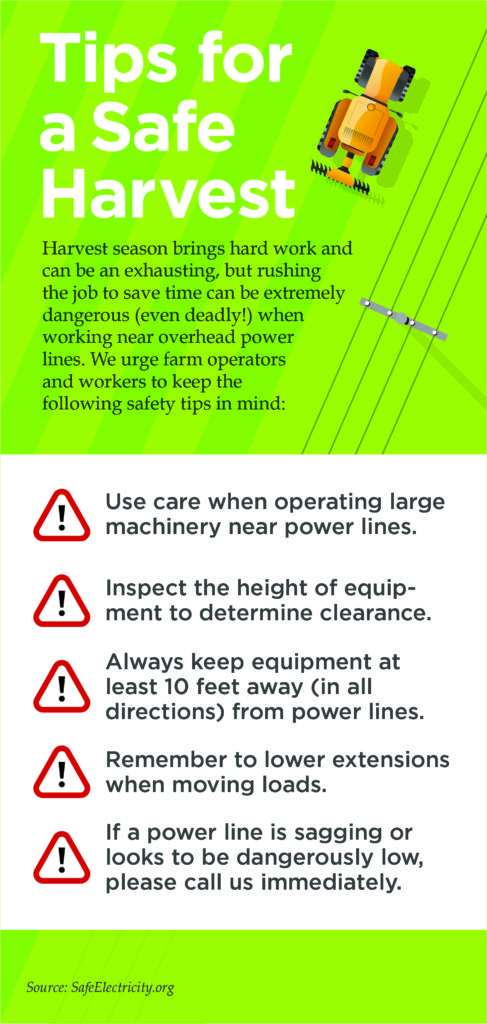The Dangers of Electricity
Electricity always seeks the shortest path to the ground and looks for a good conductor, such as metal, that transmits it easily. The human body is also a good conductor because it is about 70% water. If you touch anything with a live current, a bare wire, or faulty connection, electricity will pass through you to the ground. Depending on the strength of the current, the electricity could seriously injure or fatally shock you.

Outdoor Safety Tips
- Downed power lines: Always assume downed power lines are “live” and stay away. Do not attempt to remove anything in contact with a downed power line or drive across a downed power line.
- Vehicle safety: If your vehicle or tractor comes in contact with a downed power line, stay inside and use your cell phone to call for help.
- Personal contact: If someone is shocked by contact with a downed line, call 911 immediately and do not touch the person.
- Metal ladders: Never use a metal ladder when working anywhere near power lines or electrical devices. When using a wooden or fiberglass ladder, keep clear of electric lines.
- Flying kites: Teach children to never fly kites, model airplanes, or balloons near overhead power lines.
- Climbing trees: Warn children to never climb a tree that is near power lines. If the wind or child’s weight causes a limb to touch a wire, there is a danger of electrocution to anyone in or near the tree.
- Transformer boxes: Do not let children play on or near transformer boxes, or put anything in them. If you see an unlocked transformer box, please contact MVEC.
Home Safety Tips
hazards are often taken for granted. Each May, safety organizations raise the awareness of potential home electrical hazards, electrical fire safety, and the safety of electrical workers and the general public.
Computers, kitchen appliances, heaters, fans, air conditioners – any equipment powered by electricity has the potential to be involved in an electrical fire. Electrical safety awareness is always important, but during this particular time of the pandemic, it is even more so as thousands of workers and students have left offices and classrooms to work and learn from home. This means more family members are now online, watching television, and using appliances all at once — and for longer periods of time.
You can take simple steps to greatly reduce electrical hazards like learning the proper way to plug in appliances, safeguarding electrical outlets in the home, and more.
Homeowners should also have all electrical work done by a qualified electrician, including scheduling electrical inspections when buying or remodeling a home. It is critical that you call a qualified electrician immediately if you experience any of the following:
- Frequent problems with blowing fuses or tripping circuit breakers
- A tingling feeling when touching an electrical appliance
- Discolored or warm wall outlets
- A burning or rubbery smell coming from an appliance
- Flickering or dimming lights
- Sparks from an outlet
Conduct your own home electrical inspection:

Farm Safety
A critical part of safety around electricity is awareness. It’s important to remember that farm machinery is vulnerable to hitting power lines because of its large size, height, and extensions. Being aware of the location of overhead power lines and planning a safe equipment route can help reduce accidents.
When using equipment with auto-guidance systems, less focus is needed on steering, which may lead some drivers to think that they do not need to be as aware of navigation issues. However, even while using a GPS with auto-steering, farmworkers need to keep safety in mind and stay focused on their surroundings.
Regardless of the technology used on the farm, keep the following electrical safety guidelines in mind:
- Use a spotter when operating large machinery near power lines.
- Keep equipment at least 10 feet from power lines—at all times, in all directions.
- Look up and use care when moving any equipment such as extending augers or raising the bed of grain trucks around power lines.
- Inspect the height of farm equipment to determine clearance.
- Always set extensions to the lowest setting when moving loads to prevent contact with overhead power lines. Grain augers should always be positioned horizontally before being moved.
- Never attempt to move a power line out of the way or raise it for clearance. If a power line is sagging or low, contact our Dispatch Center at (952) 492-8255 or (800) 232-2328.
If your equipment does make contact with a power line, do not leave the cab. Immediately call 911, warn others to stay away, and wait for the utility crew to cut the power. The only reason to exit equipment that has come into contact with overhead lines is if the equipment is on fire, which is rare. However, if this is the case, jump off the equipment with your feet together and without touching the ground and machinery at the same time. Then, still keeping your feet together, hop to safety as you leave the area. For more information on electrical safety, visit the Safe Electricity website.

Winter Weather Safety
When winter temperatures drop and storms hit, it can be challenging to stay safe and warm. Winter storm severity varies depending on where you live, but nearly all Americans are affected by extreme winter storms at some point. Heavy snow and ice can lead to downed power lines, leaving co-op members without power. During extremely low temperatures, this can be dangerous. During a power outage, our crews will continue to work as quickly and safely as possible to restore power, but there are a few things you can do to prepare yourself.
- Stay warm – Plan to use a safe alternate heating source, such as a fireplace or wood-burning stove during a power outage. These are great options to keep you and your loved ones warm, but exercise caution when using, and never leave the heating source unattended. If you are using gasoline-, propane- or natural gas-burning devices to stay warm, never use them indoors. Remember that fuel- and wood-burning sources of heat should always be properly ventilated. Always read the manufacturer’s directions before using.
- Stay fed – The CDC recommends having several days’ supply of food that does not need to be cooked handy. Crackers, cereal, canned goods, and bread are good options. Five gallons of water per person should also be available in the event of an extended power outage.
- Stay safe – When an outage occurs, it usually means power lines are down. It is best not to travel during winter storms, but if you must, bring a survival kit along, and do not travel alone. If you encounter downed lines, always assume they are live. Stay as far away from the downed lines as possible, and report the situation to our dispatchers by calling (952) 492-8255 if possible.
Summer Storm Safety
When thunderstorms are rolling your way, stay safe with these helpful tips from the American Red Cross:
- Listen to local news or NOAA Weather Radio for emergency updates. Watch for signs of a storm, like darkening skies, lightning flashes, or increasing wind.
- Postpone outdoor activities if thunderstorms are likely to occur. Many people struck by lightning are not in the area where rain is occurring.
- If a severe thunderstorm warning is issued, take shelter in a substantial building or in a vehicle with the windows closed. Get out of mobile homes that can blow over in high winds. If you can hear thunder, you are close enough to be in danger from lightning. If thunder roars, go indoors! The National Weather Service recommends staying inside for at least 30 minutes after the last thunderclap.
- Avoid electrical equipment and telephones. Use battery-powered TVs and radios instead.
- Shutter windows and close outside doors securely. Keep away from windows.
- Do not take a bath, shower, or use plumbing.
- If you are driving, try to safely exit the roadway and park. Stay in the vehicle and turn on the emergency flashers until the heavy rain ends. Avoid touching metal or other surfaces that conduct electricity in and outside the vehicle.
- If you are outside and cannot reach a safe building, avoid high ground; water; tall, isolated trees; and metal objects such as fences or bleachers. Picnic shelters, dugouts, and sheds are NOT safe.